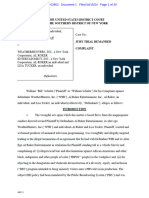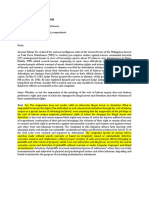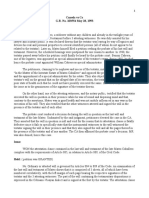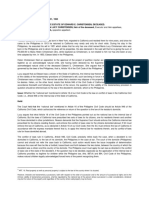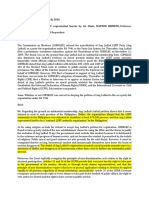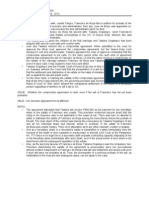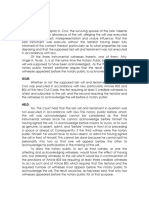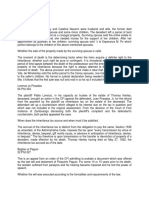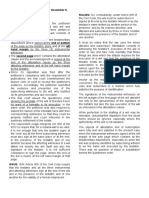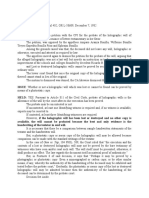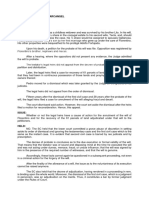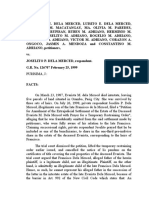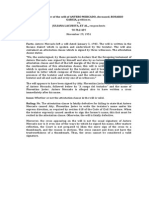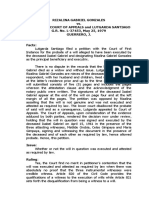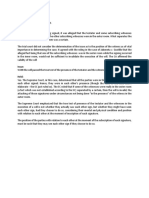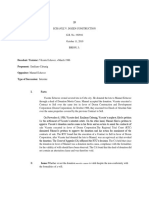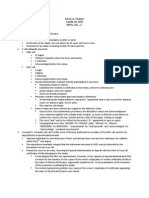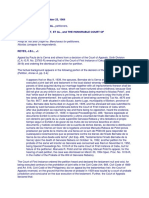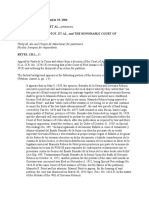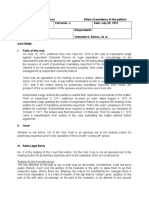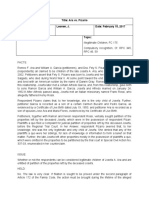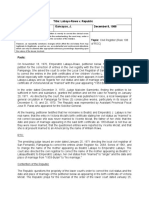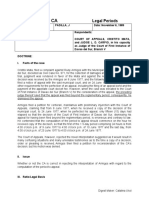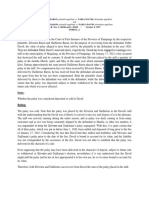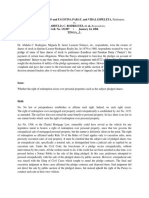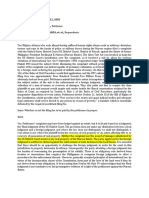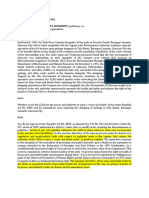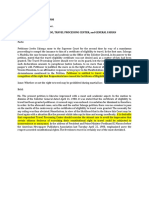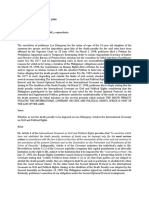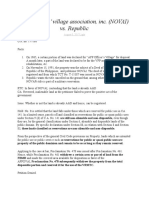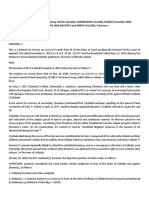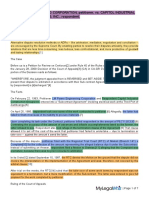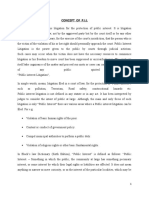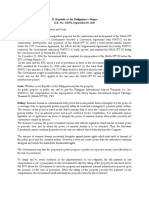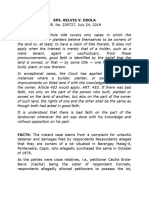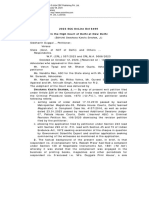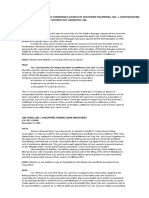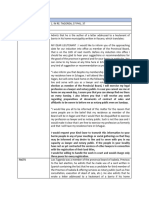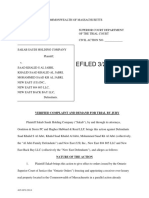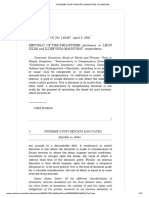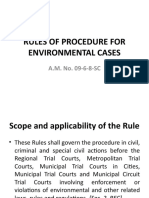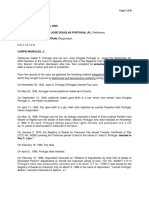04 de La Cerna Vs Potot - Case Digest
04 de La Cerna Vs Potot - Case Digest
Uploaded by
OM MolinsCopyright:
Available Formats
04 de La Cerna Vs Potot - Case Digest
04 de La Cerna Vs Potot - Case Digest
Uploaded by
OM MolinsOriginal Description:
Original Title
Copyright
Available Formats
Share this document
Did you find this document useful?
Is this content inappropriate?
Copyright:
Available Formats
04 de La Cerna Vs Potot - Case Digest
04 de La Cerna Vs Potot - Case Digest
Uploaded by
OM MolinsCopyright:
Available Formats
G.R. No.
L-20234 December 23, 1964
PAULA DE LA CERNA, ET AL., petitioners, vs. MANUELA REBACA POTOT, ET AL., and THE HONORABLE
COURT OF APPEALS, respondents.
Facts:
On May 9, 1939, the spouses, Bernabe de la Serna and Gervasia Rebaca, executed a joint last will and testament
whereby they willed that "our two parcels of land acquired during our marriage together with all improvements
thereon shall be given to Manuela Rebaca, our niece, whom we have nurtured since childhood, because God did not
give us any child in our union, Manuela Rebaca being married to Nicolas Potot." Bernabe dela Serna died on August
30, 1939, and the aforesaid will was submitted to probate by said Gervasia and Manuela before the Court of First
Instance of Cebu which, after due publication as required by law and there being no opposition, heard the evidence,
and declared the document legalized as the testament and last will of the late Bernabe de la Serna. Upon the death
of Gervasia Rebaca on October 14, 1952, another petition for the probate of the same will insofar as Gervasia was
concerned was filed on November 6, 1952.
The Court of First Instance declared the testament null and void for being executed contrary to the prohibition of joint
wills in the Civil Code (Art. 669, Civil Code of 1889 and Art. 818, Civil Code of the Philippines); but on appeal by the
testamentary heir, the Court of Appeals reversed, on the ground that the decree of probate in 1939 was issued by a
court of probate jurisdiction and conclusive on the due execution of the testament. The Court of Appeals also
declared that: “It is true the law (Art. 669, old Civil Code; Art. 818, new Civil Code). prohibits the making of a will
jointly by two or more persons either for their reciprocal benefit or for the benefit of a third person. However, this form
of will has long been sanctioned by the use, and the same has continued to be used; and when, as in the present
case, one such joint last will and testament has been admitted to probate by final order of a Court of competent
jurisdiction, there seems to be no alternative except to give effect to the provisions thereof that are not contrary to
law, as was done in the case of Macrohon vs. Saavedra, 51 Phil. 267, wherein our Supreme Court gave effect to the
provisions of the joint will therein mentioned, saying, "assuming that the joint will in question is valid."
Issue: Whether or not the Court of Appeals is correct in reversing the order of the Court of First Instance that the joint
testament by the spouses is null and void.
Held:
Yes. The appealed decision correctly held that the final decree of probate, entered in 1939 by the Court of First
Instance of Cebu (when the testator, Bernabe de la Cerna, died), has conclusive effect as to his last will and
testament despite the fact that even then the Civil Code already decreed the invalidity of joint wills, whether in favor of
the joint testators, reciprocally, or in favor of a third party (Art. 669, old Civil Code). The error thus committed by the
probate court was an error of law, that should have been corrected by appeal, but which did not affect the jurisdiction
of the probate court, nor the conclusive effect of its final decision, however erroneous.
Petitioners, as heirs and successors of the late Bernabe de la Cerna, are concluded by the 1939 decree admitting his
will to probate. The contention that being void the will cannot be validated, overlooks that the ultimate decision on
whether an act is valid or void rests with the courts, and here they have spoken with finality when the will was
probated in 1939.
It is unnecessary to emphasize that the fact that joint wills should be in common usage could not make them valid
when our Civil Codes consistently invalidated them, because laws are only repealed by other subsequent laws, and
no usage to the contrary may prevail against their observance (Art. 5, Civ. Code of 1889; Art. 7, Civil Code of the
Philippines of 1950).
You might also like
- Schultz v. RokerDocument67 pagesSchultz v. RokerTHR100% (1)
- Aberca vs. Fabian Ver - Case DigestDocument1 pageAberca vs. Fabian Ver - Case DigestOM Molins0% (1)
- Secretary of Justice Vs Lantion - Case DigestDocument1 pageSecretary of Justice Vs Lantion - Case DigestOM Molins33% (6)
- Caneda Vs Ca G.R. No. 103554 May 28, 1993 FactsDocument3 pagesCaneda Vs Ca G.R. No. 103554 May 28, 1993 FactsHappy Kid100% (1)
- Echavez Vs Dozen ConstructionDocument2 pagesEchavez Vs Dozen ConstructionCarie Lawyerr100% (1)
- 11 Baltazar vs. LaxaDocument1 page11 Baltazar vs. LaxaJoshua Erik MadriaNo ratings yet
- Bicomong Vs AlmanzaDocument2 pagesBicomong Vs AlmanzaEsraRamos100% (1)
- Ortega v. ValmonteDocument2 pagesOrtega v. ValmonteAnjNo ratings yet
- Noble Vs NobleDocument4 pagesNoble Vs NobleIvan Montealegre ConchasNo ratings yet
- 06 in The Matter of The Testate Estate of Edward Christensen - Case DigestDocument1 page06 in The Matter of The Testate Estate of Edward Christensen - Case DigestOM MolinsNo ratings yet
- Ang Ladlad Vs Comelec - Case DigestDocument1 pageAng Ladlad Vs Comelec - Case DigestOM Molins100% (5)
- Garcia vs. ThioDocument1 pageGarcia vs. ThioOM MolinsNo ratings yet
- Pimentel vs. Office of The Executive Secretary - Case DigestDocument1 pagePimentel vs. Office of The Executive Secretary - Case DigestOM MolinsNo ratings yet
- Sample Hospital Medical Malpractice ComplaintDocument7 pagesSample Hospital Medical Malpractice ComplaintEric Cortes100% (3)
- Dela Cerna V Potot Case DigestDocument2 pagesDela Cerna V Potot Case DigesthistabNo ratings yet
- de La Cerna vs. PototDocument1 pagede La Cerna vs. PototASGarcia24No ratings yet
- Bonilla v. BarcenaDocument2 pagesBonilla v. BarcenaD De LeonNo ratings yet
- Icasiano vs. IcasianoDocument1 pageIcasiano vs. IcasianoJoshua Erik MadriaNo ratings yet
- Austria Vs ReyesDocument2 pagesAustria Vs ReyesJacqueline Carlotta SydiongcoNo ratings yet
- Gallanosa Vs ArcangelDocument4 pagesGallanosa Vs ArcangelwesleybooksNo ratings yet
- Kalaw v. RelovaDocument2 pagesKalaw v. RelovaCharmila Siplon100% (1)
- Gan v. YapDocument1 pageGan v. YapAnjNo ratings yet
- De Borja v. Vda. de BorjaDocument1 pageDe Borja v. Vda. de Borjaviva_33100% (1)
- Gonzales V CADocument2 pagesGonzales V CAKristine GarciaNo ratings yet
- Bonilla V Barcena Case DigestDocument2 pagesBonilla V Barcena Case Digesthistab100% (4)
- Crisologo Vs SingsonDocument1 pageCrisologo Vs SingsonAnonymous U0WMxKmNo ratings yet
- Taboada V RosalDocument2 pagesTaboada V RosalMharey75% (4)
- Cruz V VillasorDocument1 pageCruz V VillasorGillian Calpito100% (1)
- NERA v. RIMANDODocument1 pageNERA v. RIMANDOMhareyNo ratings yet
- Edroso Vs SablanDocument4 pagesEdroso Vs SablanCaitlin KintanarNo ratings yet
- Rule 3 - Codoy vs. CalugayDocument2 pagesRule 3 - Codoy vs. CalugayErwin Bernardino100% (1)
- Del Rosario Vs ConananDocument2 pagesDel Rosario Vs ConananEsraRamosNo ratings yet
- 3 - Aznar v. Duncan DigestDocument1 page3 - Aznar v. Duncan DigestRea Jane B. Malcampo100% (1)
- Ibarle Vs PoDocument2 pagesIbarle Vs PoRepolyo Ket CabbageNo ratings yet
- Roxas Vs de Jesus Succession DigestDocument2 pagesRoxas Vs de Jesus Succession DigestCJNo ratings yet
- Taboada vs. Rosal No. L-35033, November 5, 1982 (118 SCRA 195) Facts: RULING: No. Undoubtedly, Under Article 805 ofDocument1 pageTaboada vs. Rosal No. L-35033, November 5, 1982 (118 SCRA 195) Facts: RULING: No. Undoubtedly, Under Article 805 ofJerwin DaveNo ratings yet
- Rosales vs. RosalesDocument2 pagesRosales vs. RosalesVloudy Mia Serrano PangilinanNo ratings yet
- Gonzales v. CADocument2 pagesGonzales v. CAAnjNo ratings yet
- Art 804 Acop Vs Piraso DigestDocument1 pageArt 804 Acop Vs Piraso Digestksulaw2018No ratings yet
- Reyes vs. Barretto-DatuDocument2 pagesReyes vs. Barretto-DatuLucas Gabriel Johnson100% (1)
- Abangan VS Abangan GR No 13431 November 12 1919Document1 pageAbangan VS Abangan GR No 13431 November 12 1919Christan AxeNo ratings yet
- 74 Azaola v. SingsonDocument2 pages74 Azaola v. Singsonviva_33100% (1)
- Rosales v. Rosales Case DigestDocument2 pagesRosales v. Rosales Case Digesthmn_scribd100% (1)
- Rodelas v. AranzaDocument1 pageRodelas v. AranzaKrisha Marie CarlosNo ratings yet
- Victoria V Rigor Case DigestDocument2 pagesVictoria V Rigor Case DigesthistabNo ratings yet
- Vitug vs. Court of Appeals: GR. No. 82027, March 29, 1990Document2 pagesVitug vs. Court of Appeals: GR. No. 82027, March 29, 1990Lucas Gabriel Johnson67% (3)
- 23 - Javellana Vs LedesmaDocument1 page23 - Javellana Vs LedesmaJoshua Erik MadriaNo ratings yet
- Case: Gallanosa vs. ArcangelDocument2 pagesCase: Gallanosa vs. ArcangelAngelRea0% (1)
- G.R. No. 126707Document2 pagesG.R. No. 126707Bluebells33No ratings yet
- Garcia Mercado Vs Lacuesta Succession DigestDocument1 pageGarcia Mercado Vs Lacuesta Succession DigestCJ100% (2)
- G.R. No. L-37453Document2 pagesG.R. No. L-37453CAJ100% (1)
- Nera v. Rimando G.R. L-5971, February 27, 1911 FactsDocument1 pageNera v. Rimando G.R. L-5971, February 27, 1911 FactsJani MisterioNo ratings yet
- 25 ECHAVEZ V. DOZEN CONSTRUCTION G.R. No. 192916Document3 pages25 ECHAVEZ V. DOZEN CONSTRUCTION G.R. No. 192916JC Hilario100% (1)
- Azaola v. Singson DigestDocument2 pagesAzaola v. Singson DigestAnit EmersonNo ratings yet
- Maloto Vs CA DigestDocument2 pagesMaloto Vs CA DigestAnne Aganap100% (1)
- Florentino V FlorentinoDocument2 pagesFlorentino V FlorentinoGillian CalpitoNo ratings yet
- Apolonio Taboada vs. Hon. Avelino Rosal DigestDocument1 pageApolonio Taboada vs. Hon. Avelino Rosal DigestMarie Chielo100% (1)
- Garcia V LacuestaDocument2 pagesGarcia V LacuestaPablo Jan Marc Filio100% (1)
- CD - 3. Peralta V Heirs of BernardinaDocument1 pageCD - 3. Peralta V Heirs of BernardinaMykaNo ratings yet
- Suroza V Honrado Case DigestDocument2 pagesSuroza V Honrado Case Digesthistab100% (1)
- Ramon N. Bilbao v. Dalmacio BilbaoDocument2 pagesRamon N. Bilbao v. Dalmacio BilbaoAnna Dominique Gevaña MarmolNo ratings yet
- Kalaw Vs RelovaDocument3 pagesKalaw Vs RelovaLen Sor Lu100% (1)
- 05 Estate of RodriguezDocument1 page05 Estate of RodriguezOM MolinsNo ratings yet
- Dorotheo V CADocument2 pagesDorotheo V CAAnj100% (1)
- Digest - Garcia V VasquezDocument2 pagesDigest - Garcia V VasquezMarian ChavezNo ratings yet
- G.R. No. L-20234 Dela Cerna V PototDocument5 pagesG.R. No. L-20234 Dela Cerna V PototRogie ToriagaNo ratings yet
- de La Cerna v. PototDocument3 pagesde La Cerna v. PototMarie ReloxNo ratings yet
- Philip M. Alo and Crispin M. Menchavez For Petitioners. Nicolas Jumapao For RespondentsDocument3 pagesPhilip M. Alo and Crispin M. Menchavez For Petitioners. Nicolas Jumapao For RespondentsMariaNo ratings yet
- Civ Rev 1 Somosa vs. RamosDocument2 pagesCiv Rev 1 Somosa vs. RamosOM MolinsNo ratings yet
- Civ Rev 1 Abella Vs CabaneroDocument2 pagesCiv Rev 1 Abella Vs CabaneroOM MolinsNo ratings yet
- Civ Rev 1 Moore Vs RepublicDocument2 pagesCiv Rev 1 Moore Vs RepublicOM MolinsNo ratings yet
- Civ Rev 1 Buccat Vs BuccatDocument1 pageCiv Rev 1 Buccat Vs BuccatOM MolinsNo ratings yet
- Civ Rev 1 Ara Vs PizarroDocument2 pagesCiv Rev 1 Ara Vs PizarroOM MolinsNo ratings yet
- 03 - Estate of GibersonDocument1 page03 - Estate of GibersonOM MolinsNo ratings yet
- Civ Rev 1 in Re SzatrowDocument2 pagesCiv Rev 1 in Re SzatrowOM MolinsNo ratings yet
- Civ Rev 1 Rowe Vs RepublicDocument2 pagesCiv Rev 1 Rowe Vs RepublicOM MolinsNo ratings yet
- 02 - Fleumer v. HixDocument1 page02 - Fleumer v. HixOM MolinsNo ratings yet
- Civ Rev 1 Dela Cruz Vs Dela CruzDocument2 pagesCiv Rev 1 Dela Cruz Vs Dela CruzOM MolinsNo ratings yet
- 07 - Estate of Amos BellisDocument1 page07 - Estate of Amos BellisOM MolinsNo ratings yet
- Civ Rev 1 - Armigos Vs CADocument2 pagesCiv Rev 1 - Armigos Vs CAOM MolinsNo ratings yet
- Civ Rev 1 Lichauco de Leon Vs CADocument3 pagesCiv Rev 1 Lichauco de Leon Vs CAOM MolinsNo ratings yet
- 05 Estate of RodriguezDocument1 page05 Estate of RodriguezOM MolinsNo ratings yet
- 01 in Re Will and Testament of REVEREND ABADIADocument1 page01 in Re Will and Testament of REVEREND ABADIAOM MolinsNo ratings yet
- Baron Vs DavidDocument1 pageBaron Vs DavidOM MolinsNo ratings yet
- DBP vs. CADocument1 pageDBP vs. CAOM MolinsNo ratings yet
- Paray and Espeleta vs. RodriguezDocument1 pageParay and Espeleta vs. RodriguezOM MolinsNo ratings yet
- People Vs GrijaldoDocument1 pagePeople Vs GrijaldoOM MolinsNo ratings yet
- Ombudsman Vs CSC - Case DigestDocument1 pageOmbudsman Vs CSC - Case DigestOM MolinsNo ratings yet
- Mijares Vs Ranada - Case DigestDocument1 pageMijares Vs Ranada - Case DigestOM Molins100% (2)
- LLDA Vs CA - Case DigestDocument1 pageLLDA Vs CA - Case DigestOM MolinsNo ratings yet
- Salonga Vs Hermoso - Case DigestDocument1 pageSalonga Vs Hermoso - Case DigestOM Molins100% (1)
- Echegaray vs. Secretary of Justice - Case DigestDocument1 pageEchegaray vs. Secretary of Justice - Case DigestOM Molins100% (1)
- Navy Officers' Village Association, Inc. (NOVAI) vs. RepublicDocument26 pagesNavy Officers' Village Association, Inc. (NOVAI) vs. RepublicLau NunezNo ratings yet
- Botka ResumeDocument2 pagesBotka Resumeapi-355880422No ratings yet
- Answer Denying Genuineness and Due Execution of InstrumentDocument2 pagesAnswer Denying Genuineness and Due Execution of Instrumentpante enriNo ratings yet
- Emilio v. Rapal (Highlighted + Annotated)Document3 pagesEmilio v. Rapal (Highlighted + Annotated)Tzu MinminNo ratings yet
- Heirs of Cullado vs. GutierrezDocument15 pagesHeirs of Cullado vs. GutierrezHumility Mae FrioNo ratings yet
- LM Power Engineering Corporation Vs Capitol Industrial Construction Group PDFDocument7 pagesLM Power Engineering Corporation Vs Capitol Industrial Construction Group PDFBANanaispleetNo ratings yet
- Bungcayao v. Fort Ilocandia, GR No. 170483Document5 pagesBungcayao v. Fort Ilocandia, GR No. 170483Pauline Licaycay100% (1)
- CIVPRO SPECIAL CIVIL ACTIONS FORCIBLE ENTRY AND UNLAWFUL DETAINER - Optimum Dev't Bank V Sps Jovellanos. v. CADocument2 pagesCIVPRO SPECIAL CIVIL ACTIONS FORCIBLE ENTRY AND UNLAWFUL DETAINER - Optimum Dev't Bank V Sps Jovellanos. v. CAAbbieBallesterosNo ratings yet
- Heirs of Ypon VS RicaforteDocument2 pagesHeirs of Ypon VS RicafortemgeeNo ratings yet
- TC001 (RESPONDANT) AMISHA GUPTAaaaaaaaaaaaaaaaaaDocument33 pagesTC001 (RESPONDANT) AMISHA GUPTAaaaaaaaaaaaaaaaaaKatyayani TiwariNo ratings yet
- Kwong Sing vs. City of Manila, 41 Phil 103 (Group 4)Document2 pagesKwong Sing vs. City of Manila, 41 Phil 103 (Group 4)Earlene Dale100% (1)
- Constantino Vs ConstantinoDocument2 pagesConstantino Vs ConstantinooabeljeanmoniqueNo ratings yet
- #27 Alolino V. Flores G.R. No. 198774 - April 4, 2016 DOCTRINE: An Easement Is An Encumbrance Imposed Upon An Immovable For The Benefit ofDocument4 pages#27 Alolino V. Flores G.R. No. 198774 - April 4, 2016 DOCTRINE: An Easement Is An Encumbrance Imposed Upon An Immovable For The Benefit ofBeatrice AbanNo ratings yet
- Public Interest LitigationDocument45 pagesPublic Interest LitigationNaveen Singh GurjarNo ratings yet
- Cases 91-159 FinalDocument140 pagesCases 91-159 FinalChristian ParalejasNo ratings yet
- Spouses Belvis v. Spouses Erola, G.R. No. 239727, (July 24, 2019)Document25 pagesSpouses Belvis v. Spouses Erola, G.R. No. 239727, (July 24, 2019)Pastel Rose CloudNo ratings yet
- Sidharth Duggal JudgmentsDocument10 pagesSidharth Duggal JudgmentsHimanshu SethiNo ratings yet
- Abella vs. AbellaDocument6 pagesAbella vs. AbellaphiaNo ratings yet
- Abra Valley College, Inc. v. Aquino, 162 SCRA 106Document2 pagesAbra Valley College, Inc. v. Aquino, 162 SCRA 106MonikkaNo ratings yet
- Seventh Day Adventist Conference Church of Southern Philippines, Inc. V. Northeastern Mindanao Mission of Seventh Day Adventist, IncDocument3 pagesSeventh Day Adventist Conference Church of Southern Philippines, Inc. V. Northeastern Mindanao Mission of Seventh Day Adventist, Incjobelle barcellanoNo ratings yet
- Saberon vs. VentanillaDocument4 pagesSaberon vs. VentanillaZsazsaNo ratings yet
- Bale Compiled DigestDocument146 pagesBale Compiled DigestAmando III JayonaNo ratings yet
- Sakab Complaint Against Saad Al-JabriDocument128 pagesSakab Complaint Against Saad Al-JabriUmar Farooq100% (1)
- Republic V SilimDocument13 pagesRepublic V SilimShane FulguerasNo ratings yet
- Rules of Procedure For Environmental CasesDocument71 pagesRules of Procedure For Environmental CasesAdi LimNo ratings yet
- Petitioners: en BancDocument28 pagesPetitioners: en BancAbijah Gus P. BitangjolNo ratings yet
- Philippine National Construction Corporation vs. Court of Appeals (GR No. 159270, 22 August 2005)Document7 pagesPhilippine National Construction Corporation vs. Court of Appeals (GR No. 159270, 22 August 2005)JMae MagatNo ratings yet
- Portugal vs. PortugalDocument8 pagesPortugal vs. PortugalGilbert YapNo ratings yet
